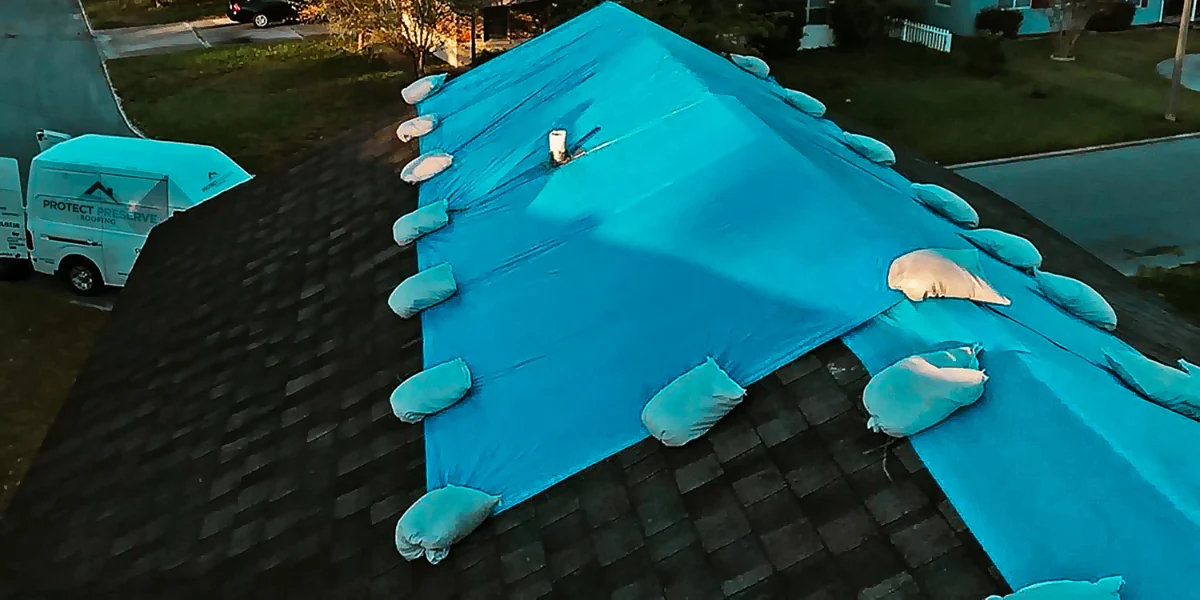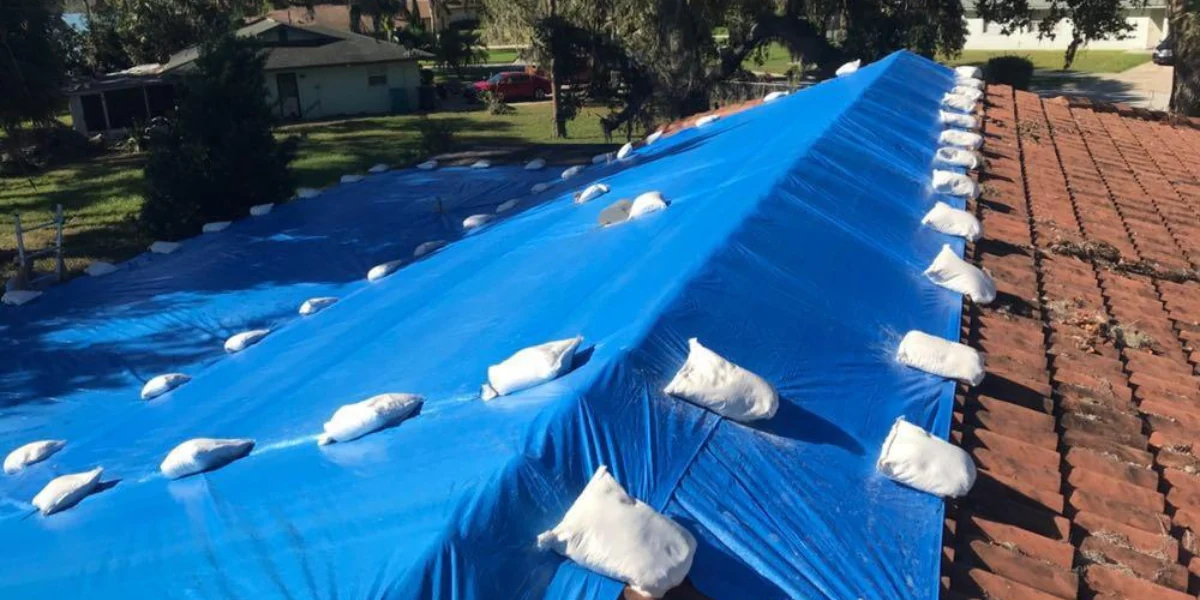When your roof takes a beating from storms or age, you might ask: “Blue tarp vs roof replacement, what is the smater choice?”.
This question is crucial for homeowners in Florida, where weather can be relentless. Blue tarps can provide quick relief after damage, but roof replacement maybe better for long-term safety.
Statistics show that over 1.6 million homes in Florida have been damaged by severe weather in the past decade, leaving many owners scrambling for solutions. According to experts from University of Florida, even a temporary cover can prevent thousands in future repairs. But there’s a catch: tarps are short-term.
Today we will answer your questions, putting blue tarp vs roof replacement on the balance so that you can identify the best path, the costs and which is actually best for your home.
Don’t wait for the next rain, make a safe choice, with all the information, today.
When to Use a Blue Tarp vs. Full Roof Replacement
A damaged roof can feel like a ticking time bomb. You’ve got leaks, water damage and the stress of figuring out what to do next. Many homeowners in Florida ask themselves: Do I cover the roof with a blue tarp or replace it completely?
A blue tarp can be a fast fix. It’s cheap and quick. Roofers and emergency crews use them after hurricanes or heavy storms. It stops water from getting in and buys you time to make repairs. But remember: blue tarps are short-term solutions. They’re not built to last, especially under the Florida sun.
Replacing a roof is a big step. It costs more money and takes more time. But it’s a long-term fix that protects your home for years. No more worries every time the clouds roll in. And you know what? According to data from the National Roofing Contractors Association, a new roof can last 20 to 50 years, depending on materials.
So, when should you tarp and when should you replace?
- If your roof has small damage and you need a quick patch: go with the tarp.
- If the damage is serious or the roof is old: replacement is the safer choice.
- In Florida’s wild weather, waiting too long can cost you more in repairs later.
Cost and Durability: Blue Tarp vs. Roof Replacement
Money always matters, right? So let’s talk about the numbers.
Blue tarps are cheap upfront. You can get one for $20 to $100, depending on size. Installing it yourself might seem easy, but it can cost $800 to $1,600 and it’s risky. Florida’s sun and storms beat them up fast. In just weeks or months, you’re back on that roof, patching leaks again.
Roof replacement costs more at first. A new shingle roof in Florida runs between $8,000 and $15,000. It’s a serious investment. But here’s the upside: it can last decades and add value to your home. No more trips up the ladder whenever a storm hits.
This simple table shows the differences:
| Item | Blue Tarp | Roof Replacement |
|---|---|---|
| Initial Cost | $20 – $100 + $800 – $1,600 | $8,000 – $15,000 |
| Lifespan | Weeks to months | 20 – 50 years |
| DIY Option | Yes | No (professional job) |
| Short-Term Relief | Yes | Yes |
| Long-Term Solution | No | Yes |
Here’s where Protect Preserve Roofing comes in. We don’t just throw a tarp over your problem. We know how to do it right.
Whether you need a short-term fix or a brand-new roof. Our team handles everything with care and knows Florida’s storms like the back of our hand.
Safety First: Risks and Precautions with Tarping and Replacement

Let’s be real, climbing up on your roof can be dangerous. Florida’s heat and sudden rainstorms add extra risk. Whether you’re thinking of using a blue tarp or going for a full replacement, safety is a must.
Tarping looks easy, but has hidden dangers like:
- Slippery surfaces can send you sliding.
- Strong winds can turn a loose tarp into a parachute.
- One missed step can cause a fall that ends in more than just a broken shingle.
That’s why it’s always smarter to call in professionals like Protect Preserve Roofing. We know how to install tarps safely and securely. No guesswork. No cutting corners. Just solid, reliable work that keeps you safe.
Roof replacement is even more complex:
- Removing old shingles, handling heavy materials, and working on steep slopes isn’t a DIY job.
- Professional roofers have the right tools and training to handle the risks.
If you’re thinking about tackling this alone, pause and ask yourself: Is it really worth it? One phone call to Protect Preserve Roofing can save you from a lot of pain and a trip to the ER – only on TV does going to the emergency room make you fall in love; in real life it is better to avoid.
Florida Climate Factors: How Weather Shapes Your Choice
Florida’s weather doesn’t play around. Here’s how each option stacks up when the skies turn wild:
| Factor | Blue Tarp | Roof Replacement |
|---|---|---|
| Heat Resistance | Low – Tarps can weaken and crack under Florida’s sun. | High – Modern shingles are designed for intense heat. |
| Rain & Storms | Short-term – Good for emergency leaks. | Long-term – Built to handle Florida’s wet and windy conditions. |
| Lifespan | Weeks to months at best. | 20 – 50 years of peace of mind. |
| Best Use Case | Quick cover while waiting for repairs. | Permanent fix for long-term protection. |
| Need for Replacement | Often – Tarps wear out fast. | Rare – High-quality roofs stay strong for decades. |
| Peace of Mind | Temporary relief only. | Lasting comfort and value. |
A little reminder: Protect Preserve Roofing knows exactly how to beat Florida’s weather. Whether it’s with a smart tarp installation to buy you time or a full replacement for years of safety.
Conclusion: Why Choose Protect Preserve Roofing?
You’ve seen the facts. Blue tarps are great for quick fixes, but they’re not a permanent solution. Roof replacement costs more up front, but it protects your home for decades. In Florida’s tough weather, that’s worth every cent.
Protect Preserve Roofing doesn’t just throw a tarp on your roof and walk away. We work fast and get it right the first time. Our team knows Florida’s storms and knows how to keep your home safe.
We’re not just roofers, we’re your neighbors and we care about your home.
Don’t roll the dice on your roof. We can schedule an appointment to examine your roof. You can get a quick estimate, or you can call us.









